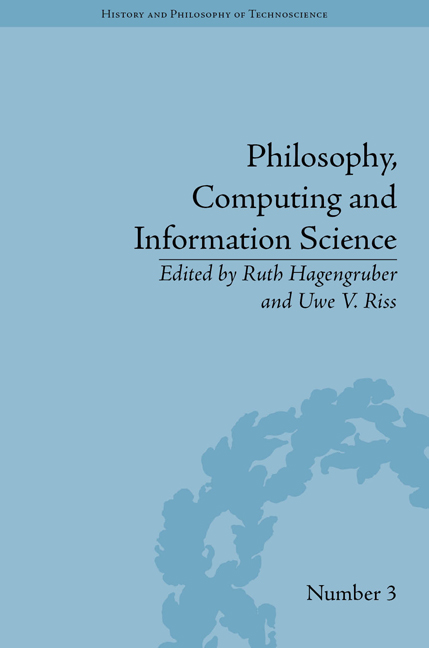Book contents
- Frontmatter
- CONTENTS
- List of Contributors
- List of Figures and Tables
- Introduction: Philosophy's Relevance in Computing and Information Science
- Part I Philosophy of Computing and Information
- 1 The Fourth Revolution in our Self-Understanding
- 2 Information Transfer as a Metaphor
- 3 With Aristotle towards a Differentiated Concept of Information?
- 4 The Influence of Philosophy on the Understanding of Computing and Information
- Part II Complexity and System Theory
- Part III Ontology
- Part IV Knowledge Representation
- Part V Action Theory
- Part VI Info-Computationalism
- Part VII Ethics
- Notes
- Index
3 - With Aristotle towards a Differentiated Concept of Information?
from Part I - Philosophy of Computing and Information
- Frontmatter
- CONTENTS
- List of Contributors
- List of Figures and Tables
- Introduction: Philosophy's Relevance in Computing and Information Science
- Part I Philosophy of Computing and Information
- 1 The Fourth Revolution in our Self-Understanding
- 2 Information Transfer as a Metaphor
- 3 With Aristotle towards a Differentiated Concept of Information?
- 4 The Influence of Philosophy on the Understanding of Computing and Information
- Part II Complexity and System Theory
- Part III Ontology
- Part IV Knowledge Representation
- Part V Action Theory
- Part VI Info-Computationalism
- Part VII Ethics
- Notes
- Index
Summary
The Predicament of the ‘Concept of Information’
We are talking about ‘information’ in many different contexts: not only in our ordinary language, but also in the highly specialized discourses of the theory of communication, computer science, physics, biology, cultural studies, and so forth. As we do so, are we using the same concept each and every time? Is there one and only one concept of information connecting all these different usages of one word (and its linguistic ‘relatives’ in languages other than English)? This question has accompanied the ‘information talk’ for many years and recently has lead to the so-called ‘Capurro trilemma’. According to this trilemma, throughout those various contexts the words we use either (A) have the same meaning or (B) completely different meanings or (C) different meanings which nevertheless are somehow connected. As the unity of meaning is a minimal condition for the identity of a concept, in case (A) there is only one concept of information (univocity); in case (B) we deal with several concepts of information (equivocation); in case (C) it is the question of just precisely how the different concepts are interconnected. The authors describing the dilemma suggest Wittgensteinian family resemblance and Aristotelian analogy, but they do not seem to be satisfied by their solutions. Therefore, according to them, we are facing a real trilemma whose single horns are equally unattractive.
- Type
- Chapter
- Information
- Philosophy, Computing and Information Science , pp. 41 - 44Publisher: Pickering & ChattoFirst published in: 2014

